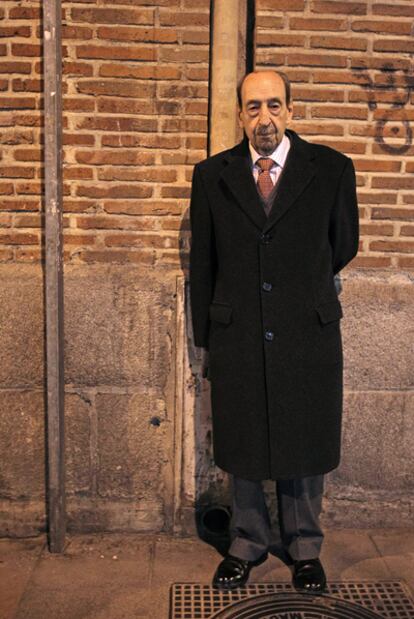"The idea that I wanted to be prime minister is ridiculous"
Former General Alfonso Armada Comyn continues to deny any involvement in 1981 coup
The aristocratic former army general - the Marquis of Santa Cruz de Ribadulla - turned 91 years old early this month. But in spite of his delicate health, Alfonso Armada Comyn still leads an active life.
Yet his public profile is much lower compared to 30 years ago, when he was put on trial as one of the leaders of the February 23, 1981 coup conspiracy. To this day, Armada denies any involvement.
Although he lost his military titles following the trial, Armada is still referred to by many out of respect as "my general" - especially by other members of the Catholic group The Holy, Pontifical and Royal Brotherhood of Refuge and Piety, which was founded in 1705. It was at the brotherhood's headquarters in Madrid where Armada last saw King Juan Carlos "seven or eight years ago," he says. The royal family is also a member of the established order.
If the coup had been successful, according to testimony presented during the 1982 trial, Armada, once a private secretary to the king, would have become Spain's new military ruler.
"I did not know any of the coup plotters - none of them," he told EL PAÍS earlier this month. "I am not one of those famous names of that story. There have been many lies told about me! All that stuff that was said - that I was going be prime minister - is ridiculous."
According to an account given by Francisco Laína, the then-director of state security, King Juan Carlos buried "his head in his hands and wept" after he heard surveillance recordings of phone conversations taken that day between Civil Guard Lt. Col. Antonio Tejero and other coup plotters explaining that Armada had arrived in Congress because "all he wants is to sit on the throne, and he doesn't care whether it's a military regime or a government of Communists."
"When the king pulled himself together, I could see that he had been crying," said Laína, who is writing a book on the event expected to be published later this year.
Armada tells a different story as to why he went to Congress that day when Tejero and his men were holding lawmakers hostage.
"What I did was inform General [Manuel] Gutiérrez Mellado on February 13 what was going to happen, but he ignored me. Later, on that day, I just obeyed all of what General [José] Gabeiras was ordering. I was with him all night, without leaving his side and, on his initiative, I obeyed his command to go see Tejero and offer him a plane to leave Spain."
Mellado and Gabeiras, who were loyal to the king, have since died.
Armada was arrested two days later after it was found that he had been plotting with the coup backers. During Armada's trial, Gabeiras testified that he allowed Armada to go to Congress to offer Tejero a chance to leave Spain, but denied telling him to discuss any leadership roles in the future government, as the implicated general was accused of doing.
Tejero said that he was against Armada becoming leader of the new government because, as he put it, he didn't want communists or politicians in the junta, as the general had proposed.
After serving seven years of a 26-year prison sentence, Armada was pardoned in 1988. His brother had asked for the pardon for health and family reasons some five years earlier. By 1983, Armada had already been thrown out of the military, along with Jaime Milans del Bosch, the lieutenant general who ordered the tanks out on the street in Valencia the night of the coup attempt.
The Galician-born Armada spent all of his life prior to the coup in the military. He saw battle during the Spanish Civil War on the Nationalist side, fighting in Teruel, Guadalajara and Madrid. During World War II, he was a captain in Francisco Franco's Blue Division unit of fascist fighters who, alongside the Nazis, charged Leningrad (now St. Petersburg).
After returning to Spain, he became an instructor at different academies. Starting in 1954 when he was assigned to groom the young Prince of Asturias Juan Carlos, he remained a close advisor to the king for more than 25 years. By 1976, he became secretary at the royal palace but was later relieved of his duties because of his reported clashes with then-Prime Minister Adolfo Suárez.
Today, when he is not in Madrid, Armada spends his time at the farm he inherited from his father in Santa Cruz de Ribadulla, in Galicia, where he grows camellias. He has 10 sons, 25 grandchildren and 14 great-grandchildren. "I have a big family that takes care of me," Armada says.
Does he hold any bitterness for all the time he spent in prison? "No. Despite it all, I am content because all that happened went to support the monarchy, and I am very proud of being a Catholic, a Spaniard and a monarchist."








































